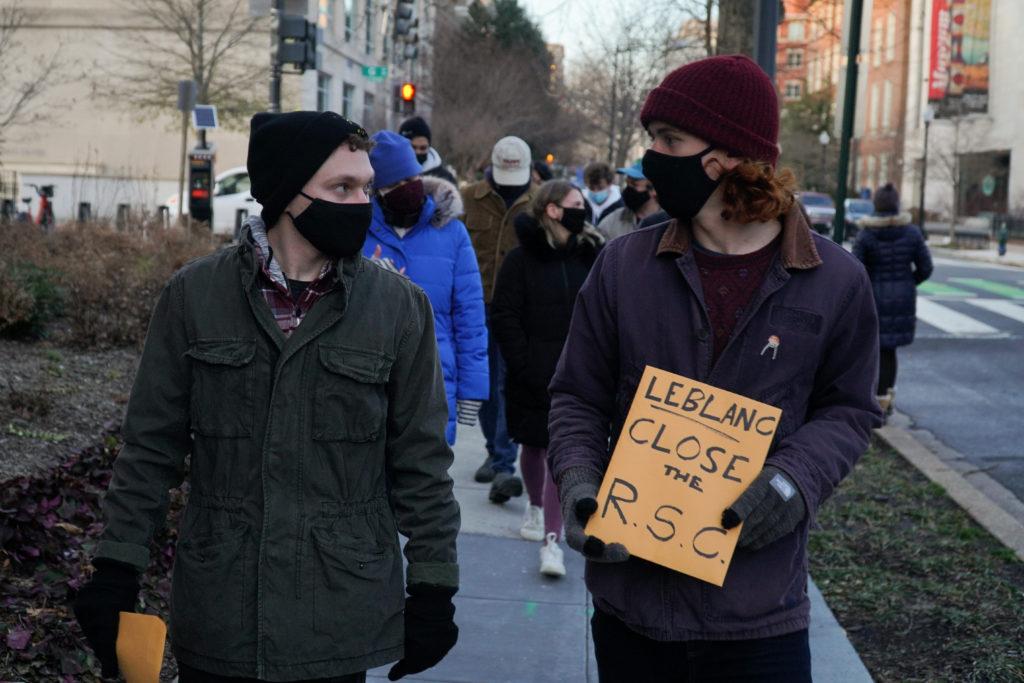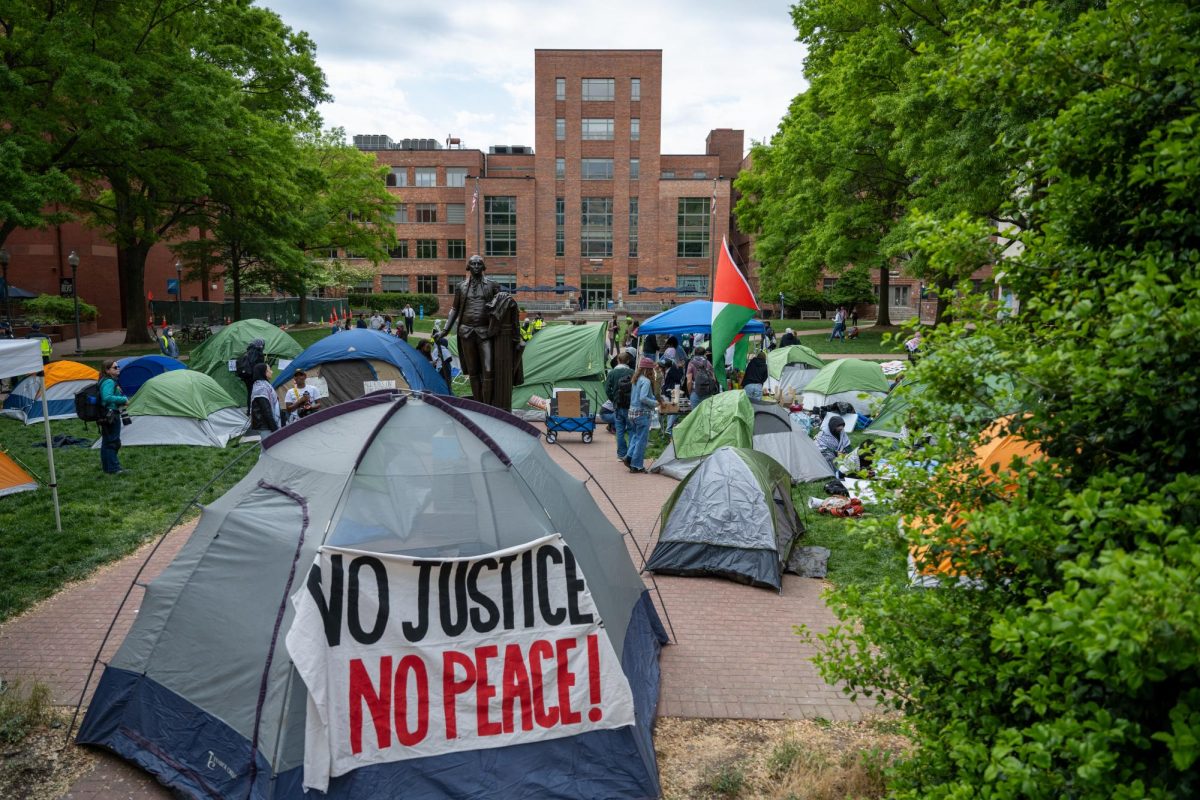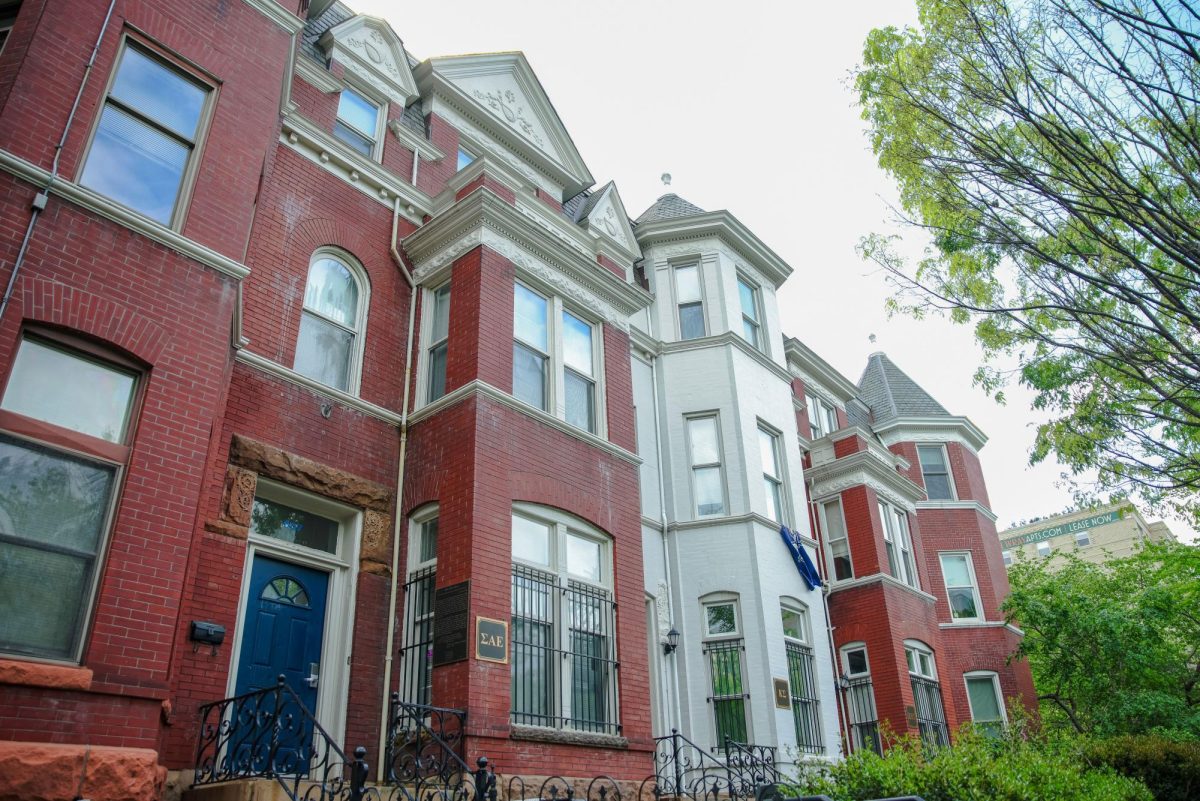Updated: Feb. 12, 2021 at 9:17 p.m.
More than a dozen members of Sunrise GW delivered a letter to University President Thomas LeBlanc’s home Monday, demanding he sever the University’s ties to the Regulatory Studies Center and end GW’s “complicity” in the climate crisis.
Sunrise leaders gathered at Kogan Plaza at about 5 p.m. and marched to the F Street House, LeBlanc’s on-campus residence, before taping a letter to his door demanding the closure of the RSC – a GW research center receiving funding from the fossil fuel industry. Student activists have pressured officials to shutter the RSC for more than a year since members assembled a public demonstration outside of LeBlanc’s residence where they delivered a previous letter calling for the RSC’s closure and GW’s divestment from fossil fuels, the latter of which officials ultimately agreed to months later.
Over the past year, the group has also interrupted an RSC event at the Marvin Center and gathered nearly 2,000 signatures for a petition for officials to reevaluate their ties with the center.
Sophomore Ethan Gettes, a Sunrise member, said the University’s partnership with the RSC is a “stain” on GW’s reputation because it promotes figures who dispute the threat of climate change and receives funding from companies that support environmental deregulation, like the Koch Foundation.
“For over a decade, the RSC has offered GW’s name and credibility to climate deniers, laundered the political agenda of fossil fuel billionaires and polluted public discourse with discredited junk science,” Gettes said in a press release. “If GW is serious about ending its complicity in the climate crisis, the RSC must be shut down or removed from campus.”
In the 7-page letter delivered to LeBlanc, Sunrise leaders said officials have failed to address the issues facing their association with the RSC, which is housed in the Trachtenberg School of Public Policy and Public Administration. The letter states Susan Dudley – the RSC’s founder and director – has supported “climate deniers, fossil fuel cronies, and other discredited backers of pseudoscience.”
“With its historic commitments in June, GW has the opportunity to be one of the nation’s leaders in combating climate change,” the letter reads. “Unfortunately, when you look the other way as climate deniers, fossil fuel cronies and discredited backers of pseudoscience trade on GW’s name and credibility, you undermine your positive actions at every turn.”
The RSC has received more than $1 million in funding from fossil fuel companies Koch Foundation and Exxon Mobil, according to the letter. The letter states more than 1,800 students, 91 faculty and staff members, 40 student organizations and multiple national organizations have signed the group’s petition for GW to “close, cut ties with or at least publicly disclose the funding, motivations and anti-regulation agenda” of the RSC.
Sunrise launched another petition Tuesday with UnKoch My Campus, an organization that investigates the relationship between wealthy donors and educational institutions, echoing calls for the University to break off from the RSC.
Public Citizen, a progressive consumer rights advocacy group, published a report in 2019 criticizing the RSC for possessing right-wing bias and opposing regulatory environmental action.
Dudley, the RSC director, has responded to criticism of the center’s financial benefactors, saying that the center does not accept funding that influences its work and all research directly supported by an outside group is “clearly identified.”
Junior Joe Markus, a member of Sunrise, said the group is focused on “relaunching” pressure on administrators this semester in hopes of forcing officials to respond to students’ concerns and pushing the Board of Trustees’ Environmental, Social and Governance Responsibility Task Force to “thoroughly examine” the University’s ties with RSC. Despite the University’s divestment announcement last year, Markus said “the job’s not done” until officials break from the RSC.
“It’s been over a year, and we have over 2,000 students, faculty and staff signed on demanding that the RSC get closed or removed from campus,” Markus said. “And we’ve heard nothing from LeBlanc, nothing from the administration, barely anything from the Board of Trustees, so that’s unacceptable. You can’t have that many voices from the University making one clear demand and not issue a response or acknowledgement or anything like that.”
Leaders of the Columbian College of Arts and Sciences, where the center is housed, and affiliated faculty issued a statement Thursday, rebuking the contents of Sunrise GW’s letter, which they say are based on the “misleading and inaccurate” Public Citizen report. The release states that criticisms of the RSC are false and overlook a broader range of the center’s members and publications, like its weekly published Regulation Digest and “academic journal articles, books, reports, commentaries, insights or working papers.”
The statement says Sunrise members have tried associating the RSC with “unaffiliated individuals and former interns” while ignoring two-thirds of the center’s staff, according to the release.
“Contrary to unsubstantiated claims, no one in the Regulatory Studies Center questions climate science,” the statement reads. “In fact, most of the Center’s scholars do not focus on environmental or energy issues at all. Those who have written on climate issues address economic and legal questions, not the science. The Regulatory Studies Center explicitly does not take institutional positions on any issues.”
The statement alleges students’ efforts at “intimidation and mischaracterization” through their protests break from the University’s values detailed in its academic freedom guidelines, which stipulate rules for the free expression of ideas on campus.
“These attacks, however, eschew the opportunity for fact-based exchange; they focus instead on challenging rigorous scholarship with ad hominem rhetoric,” the statement reads. “While individuals and organizations are free to disagree with the tools of evidence-based analysis applied by scholars in the Center, mere disagreement with another discipline does not entitle them to censor individuals or units, nor to cut off intellectual debate.”
Editor’s Note:
This post has been updated with a response from CCAS leaders and RSC-affiliated faculty.











